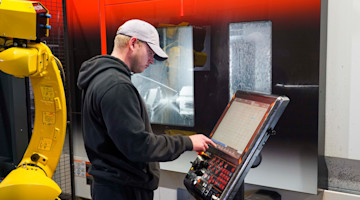While the timeline for economic recovery in the manufacturing industry is still unclear, industry leaders continue to look for strategic ways to ensure greater supply chain resiliency, make technology and other investments better positioned after the recovery, and take advantage of possible legislative support. The pandemic caused manufacturing companies to engage in a crash business course of optimizing work, necessity, and sustainability by condensing five years of innovation into the next 18 months. The industry will test its resiliency in meeting demand challenges while reimagining more sustainable business models, and the new normal moving forward will likely include greater digitalization and the normalization of supply chain integration out of necessity.
Many reopening plans have some employees working on site while others work remotely. New communication platforms such as Zoom, Slack, and Microsoft Teams have enabled communication and, in some cases, have made strategic improvements that may be here to stay. In some plants, new workspace pod designs were implanted that increase physical distance without sacrificing production.
The next and arguably more challenging step to prepare for the future is to reassess supply chains, production relationships, and demand while factoring in potential risks. Companies are looking for suppliers that have leveraged technology to build dynamic and resilient supply chains, and they are reassessing how much concentration risk they are now willing to accept in their trading relationships. Many businesses plan to adopt dual- and triple-sourcing strategies and reduce reliance on China as a supplier.
The digital transformation of the $10-trillion-plus global manufacturing sector will take place during the next one to two decades, yet it will face major challenges, including the development of standards to create a seamless workflow through procurement, production, and delivery. Quick response manufacturing (QRM) is also being evaluated to reduce lead times. QRM enables the more rapid delivery of products to market and increases profitability by eliminating non-value-added time in production and reducing inventory.
The government has an important role to play in addressing these new business challenges and an obligation to develop legislation that supports the manufacturing industry and U.S. supply chains through continued investment in advanced manufacturing technologies and tax incentives and other financial tools that serve to support reshoring. Proposed legislation, such as the Resilient Manufacturing Task Force Act of 2020, would, if passed, positively impact reshoring. Another proposal is a National Manufacturing Guard, a voluntary group of American private-sector experts who would prepare plans for supply chain and other manufacturing-related emergencies. Additionally, AMT’s Manufacturing Mandate outlines areas where government policy can have a significant impact on the manufacturing industry.
Many advanced countries recognize that manufacturing is a critical part of national policy as it creates high-paying jobs, advances technology, and produces more economic activity than any other sector. Competition for a strong manufacturing sector is global, and programs to encourage and advance manufacturing from other governments include Germany’s "Industry 4.0," France’s "Industry du Futur," and China’s "Made in China 2025."
To learn more about the issues that the manufacturing industry is facing as it recovers from the global pandemic, read the full white paper here.






